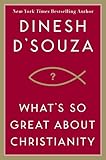

Part seven of the debate contains Dennett's first response to D'Souza, and the first half of D'Souza's reply.
Dennett begins by arguing that D'Souza has not attacked the actual, complex, arguments and theories that Dennett supports. Instead, he says, D'Souza has attacked "cartoon versions" of those ideas.
Dennett is accurate in this point, but the interesting thing is that he doesn't seem to understand why D'Souza does this. (Or, if he does, he doesn't say so.)
The reasons are, quite clearly, the pattern we have seen straight through the debate. Dennett is trying to bring understanding to the issues involved. He is, in fact, attempting to explain his position, not only to the audience, but also to D'Souza. If you pay attention to the back and forth, you'll notice that Dennett very often is talking to D'Souza directly, while D'Souza most often addresses the audience.
D'Souza is not interested in deeper understanding. He's interested in winning debating points, and motivating his anti-intellectual base to choose his side. Cartoon versions are perfectly useful for his purposes—perhaps even more useful than the accurate versions.
Dennett gives as one example the question of the fine-tuning of the universe. He makes the point which I made earlier—that it makes no sense to ask why the universe is so constructed that our planet can support life, since if it weren't we wouldn't be here. It might well have been constructed so that we weren't possible, but it had to have some form, and, this happens to be it.
In support of this idea he says that "for all we know" there could be millions of universes out there that don't support life. He doesn't, by the way, imply that there are millions. Instead he uses this idea to drive home the statistical point that it makes no sense to talk about the improbability of something that has already happened. The point stands whether there actually are any other universes or not.
He replies to D'Souza's charges about the crimes of atheists in the twentieth century by acknowledging the truth of it, but pointing out that the atheist regimes were often very like religions in their structure.
All of these points are scientific rhetoric—aimed at our understanding rather than our motivations—and most of them are sound.
The one questionable point is the last one. The problem is not the idea itself (Stalin's regime was very like some religions), but the failure, on Dennett's part, to distinguish between different kinds of religion. He is capable of this—in fact he did it in his educational proposal at the beginning or the debate, distinguishing between toxic and non-toxic forms of religion.
The source of the kind of atrocities which Dennett cites, in the case of the crusades or the inquisition, and which D'Souza cites, in the case of Hitler or Stalin, is not whether or not the people involved believed God existed, but how authoritarian their culture was. The regimes in question all had this authoritarianism in common.
D'Souza begins his response by saying that it isn't fair for Dennett to say that religion must take responsibility for the crimes done in its name, and also for the crimes done by athiests. Dennett, he argues can't get off the hook by calling Stalinism a religion.
He's essentially right on this point, as I've pointed out above. But he makes a mistake here, as well. He assumes that the terms "atheist" and "religious" are antonyms, which they aren't. Buddists, for example, are atheists. God is not a necessary part of religion. This is something that Dennett should remember, as well.
D'Souza then revisits the big bang.
His argument is pure scientific rhetoric, and runs as follows:
- All nature came into existence at the big bang.
- Therefore, the big bang could not possibly have a natural cause—since there was no nature before it.
- Everything that has a beginning has a cause.
- The universe had a beginning.
- Therefore, the universe has a cause.
- This (supernatural) cause we call God. (A nice hint of Aquinas, there.)
Unfortunately for D'Souza, the argument is weak on both ends.
First of all, there is no evidence that our universe is the only part of nature that exists. In fact, it is quite probably that nature extends beyond our universe, in some form (whether other universes, or not).
Secondly, even if we were to grant D'Souza his entire argument, it does not point to God. It points to a cause, but there is no reason why that cause should even remotely resemble Thor, or Zeus, or Yahweh. In fact, if the line of reasoning contained in points three through six is correct, it could well merely point to the error in line one—that is, it could point to a natural cause which is not part of our universe.
Next time, we'll look at his return to political rhetoric in part eight.






